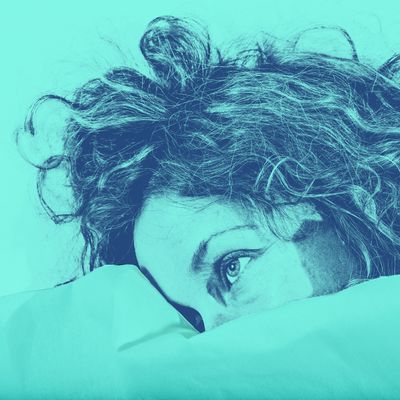
Most people have had at least a few nights after which they woke up sure that they slept no more than five minutes, or maybe an hour. For people with insomnia, nights like these are an all too common occurrence. And while lack of sleep can cause a host of problems (including poor appetite control, decreased motor function, and general crankiness), new research suggests you might actually be getting more sleep than you think — because, as it turns out, feeling awake during the night doesn’t necessarily mean that you are.
According to a new study, published in Sleep by Brigham Young University professor Daniel Kay, you can be consciously aware at the same time that your brain is in a sleep pattern — at least, parts of your brain. “It depends on your definition of sleep,” says Kay. If we define sleep as the absence of the sense of consciousness we have when we’re awake, than people with insomnia (or anyone else) are likely to classify a night in which they experienced prolonged consciousness as sleepless. Where previous studies have shown that people with insomnia report feeling awake even when scans of their brains reveal typical sleeping patterns, this discrepancy has been characterized as “sleep misperception.” But Kay says it’s more complicated than that. “I look at sleep more as a construct we’re trying to understand,” he says. “It’s not necessarily a whole brain event that you’re either awake or you’re asleep. Rather, you can have brain regions that can be in more of an awake pattern and other regions that are more in a sleep pattern.”
In other words, what has previously been characterized as “sleep discrepancy” might be a reflection of the fact that certain regions of the brain can be functionally asleep even while we retain the feeling of being awake. Kay also cites the example of sleepwalking, in which people move around, sometimes with their eyes open. “That looks more like wakefulness, but clearly there are certain parts of their brain which are still asleep.”
Kay also thinks the sleep-as-construct hypothesis could help explain why a night of poor sleep doesn’t always affect us as much as we might expect. “Sometimes with patients with insomnia, they go out and engage in activities, and they’re surprised they’re able to do as well as they are,” he says. “It may be that those other brain regions were really unaffected by their disrupted sleep, and they’re able to use those other regions to compensate for the areas that were impaired by the insomnia.”
All of this is well and good, but isn’t the most frustrating part of sleeplessness that continued, tortured awareness of one’s awakeness? And if you’re secretly getting more rest than you think, but you have to feel awake that whole time, is this really anything worth celebrating? Kay acknowledges that feeling awake is probably what’s most frustrating for patients, and knowing certain regions of your brain might be relatively well-rested doesn’t mean it won’t be a struggle to get through the day after a bad night’s sleep. But thinking of sleep as a spectrum, rather than an awake/asleep binary, may go a long way toward directing future insomnia research. For instance, previous studies have shown that consuming large amounts of caffeine can lead to what’s been long considered “sleep misperception,” which Kay suggests could mean that caffeine enhances our perception of being fully awake at night even when we’re not.
“What I’d like to do is start developing treatments that target these specific brain regions,” says Kay. “When you do [traditional cognitive behavioral therapy for sleep], you’re not just targeting these regions, you’re targeting the whole person.” One such possible treatment might use mindfulness meditation, which Kay says is linked to activity in those regions of the brain which determine our perception of awareness during sleep. If we can target those regions of the brain directly (and that’s still a big if), we might be able to close or narrow that so-called sleep misperception gap.
For now, take whatever consolation you can get from these findings: yes, you may spend the night restless, repeatedly counting down from one hundred, cursing a snoring partner at your side. But some parts of your brain are probably sleeping just fine, and hopefully they’ll carry you through tomorrow.





